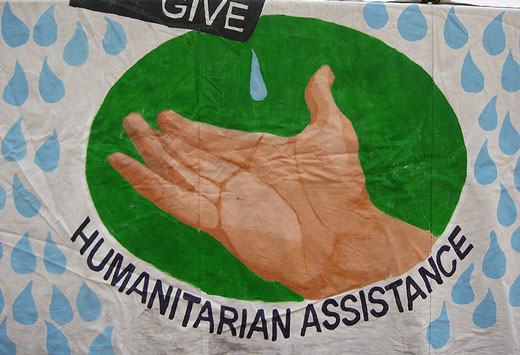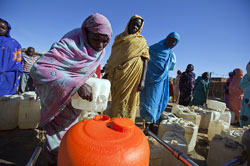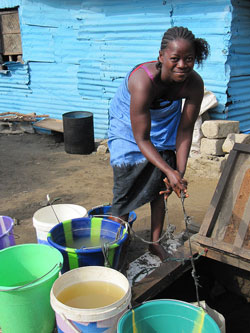
by Jeremy Allouche & Maria Cooper
Resource politics is coming back to the forefront of academic and policy debates around peacebuilding. Environmental peace and state building agendas are dominated by questions concerning informality and hybridity in resources. What kind of role do service providers play in peacebuilding and state building and what can we learn from service providers in post conflict states?
In his chapter in a new book on Water and Peacebuilding, Jeremy Allouche makes the case for paying attention to the role of informal service providers, and actively working with them to improve the transition from informal governance to state empowerment.
Resource politics is back. While recent conflicts should not make us jump to dubious conclusions about ‘resource wars’, the management of resources and their dividends is once again becoming an important concern for the international community in relation to state building and peacebuilding.
In peacebuilding, resources matter. In the ongoing Darfur conflict, for example, important resources such as water are increasingly taken into consideration in attempts to achieve peace and stability. Prominent in the attempts to resolve the conflict in recent years has been the Doha Document for Peace in Darfur (DDPD), signed in 2011 by the Sudanese government and the rebel Liberation and Justice Movement. It recognises the importance of addressing multiple issues, as well as the interlinkages between resource use, institutional reforms, state legitimacy, development and economic growth. As such, resource politics is considered an essential part of typical post-conflict restoration – ensuring that citizens’ needs are met and restarting economic activity.

Photo: UNAMID (Flickr)
Doubts about the success of the DDPD are largely blamed on the Sudanese government hindering its implementation, as well as its being supported by groups without the necessary political and military influence to endorse it. Despite the limited impact of the DDPD, the centrality of resource management to the solution of the conflict still stands. A recent UNEP report confirmed this by highlighting the importance of environmental governance in the process of peacebuilding.
Service delivery and state building
Restoring service delivery (or establishing it for the first time) is an important part of the resource management so central to peacebuilding. The economic benefits, in particular, of these infrastructural developments are emphasised in many international organisation narratives around post conflict reconstruction, as the recent NEPAD conference in Senegal shows. Donors also consider it a priority to address economic deprivation, especially as it is such a determining factor of general welfare and can in many cases be one of the underlying causes of the conflict in the first place.
However, service delivery is not only about improving the economic wellbeing of citizens. It can also play a significant role in state building, including improving the authority, legitimacy and visibility of the state and giving it a monopoly of power – for example, in taxation.
Through providing services such as water, the state can enhance its legitimacy in the eyes of its citizens as it improves their wellbeing. It is also a nonviolent way for the state to penetrate into rural or inaccessible areas, and gain a presence there.
How water links citizens to the state
An example of this can be observed in Zimbabwe following the country’s independence in 1980. The Mugabe government prioritised providing water and sanitation in rural areas whose inhabitants had been central to the armed struggle that brought Mugabe’s party into power. This increased the party’s popularity and legitimacy in the areas and a majority of the rural communities felt that they had the same rights as the urban elites. The service provision becomes a direct link between citizens and the state.
Service delivery also strengthens the state’s authority and control. The state can apply a uniform standard throughout its territory, meaning that exchange and mobility is facilitated. In addition, it contributes to equity, power-brokering and pacification as rival factions are undermined. In this way, the strengthened state can accommodate former rebels in positions of influence in public institutions to prevent them from developing alternative centres of power.
What about informal providers?
The view outlined above is, however, a narrow vision of state building which focuses on technical aspects of building state capacity, and which ignores (for example) identity issues. This view sees the state as centralised and securitised, emphasising state penetration and the definition of boundaries. It also assumes that conflict is the reason for the absence of the state provision of services.
In many post-conflict situations, the dominant providers of water are in fact non-state, informal providers. However, this might not be caused by the conflict; it might be because formal national institutions were poor or non-existent. In these situations, local communities and households will have built up their own informal methods to ensure water supply in the face of droughts, floods and other water-related risks. This informal service delivery is often sub-standard and relatively expensive. Nonetheless, in poor and peri-urban African communities, unregulated, small-scale, informal water providers dominate the delivery of water.

In fact, Western assumptions of the effects of conflict on infrastructure are often wrong. Westerners often see conflict as a highly technological battlefield, when in fact many post-colonial countries are confronted with irregular warfare favouring indirect approaches of targeting the enemy. This type of warfare means that large elements of the infrastructure are left unharmed, and may continue to be used by informal service providers in the absence of state provision. Private sector participation in water services in post-conflict situations is consequently very important.
When trying to build up formal structures and governance as part of peacebuilding and state building priorities to increase water security, it is important to take informal structures into account. Informal structures are often all that people have. Introducing government service delivery may actually damage the informal structures and affect informal livelihoods in a way that decreases water security for people. The perspective of informal service providers in the state building discourse, then, becomes critical.
The bureaucratic model
Yet the predominant approach to state building we can see today focuses on creating security and stability in order to control territory and promote regional and international trade. State service delivery is part of this, as it is considered a basis of the liberal peace model approach often used by donors to improve citizens’ wellbeing and enhancing state legitimacy. This leads to a centralised state and the view that informal service providers are resisting state authority. According to this model, informal providers are part of the problem, not the solution.
The international community thus tends to act to build a particular type of bureaucratic state emphasising depersonalised, formalised, and rationalised political power. This conception of the state is dominated by a Western Weberian discourse emphasising the role of strong bureaucracy and institutions. Its influence over the state building agenda leads to a lack of recognition of the informal service providers and the role they play in post conflict situations.
The effect of this discourse is to disconnect the state building agenda from the post-conflict reconstruction agenda. Informal service provision, however, bridges the two. For example, providing water services improves citizens’ lives and wellbeing, leading to a restart of economic activity, etc., and other important aspects of reconstruction. It is also an essential instrument for state building and improving state legitimacy and authority: if the well-being of citizens is improved, the legitimacy and authority of state institutions will be increased.
The challenge of moving from informal to state governance
There is, however, a major challenge in reconciling informal and conventional procedures of water provision. For example, regulating non-state water providers is difficult, with limitations to contracts and monitoring. The lack of recognition of informal service providers in the state building discourse has far-reaching consequences for pricing and public health. Informal service providers are able to charge very high prices as they operate in conditions without competition, and water quality is often left unchecked, leading to the spread of diseases.
Despite this, outside investments in the water sector in post-conflict situations are often considered too risky. A report by the World Bank shows that private investment in water supply tends to come much later and be more limited than other investment in infrastructure.
Instead of seeing informal service providers as part of the problem in post conflict reconstruction and state building, why aren’t they seen as part of the solution? To do so, practitioners and analysts of state building should open up the state building discourse, and talk about how to move from informal governance to regulatory governance.
The difficult part of all this is how to build up institutional capacity, which is essentially formal (‘top-down’), without harming the informal (‘bottom-up’) systems that already exist, and upon which many citizens still rely for their water provision and livelihoods. There needs to be a productive balance between formal and informal service delivery and water governance mechanisms.
The transition from informal to formal governance needs to receive more attention in the state building discourse, in order to develop a balanced and nuanced understanding of the ways in which informal and formal services can be supported in parallel, in a context-sensitive manner, to increase water security, improve citizens’ wellbeing and ultimately contribute to peacebuilding.
Further reading on water & justice
- Project: Dams: securitization, risks and the global water-energy-food nexus
- Working Paper: Nexus Nirvana or Nexus Nullity? A dynamic approach to security and sustainability in the water-energy-food nexus
- IDS Bulletin: ‘Some for All’? Politics and Pathways in Water and Sanitation
Top photo: “Humanitarian assistance” painting by futureatlas.com on Flickr (cc-by-2.0)